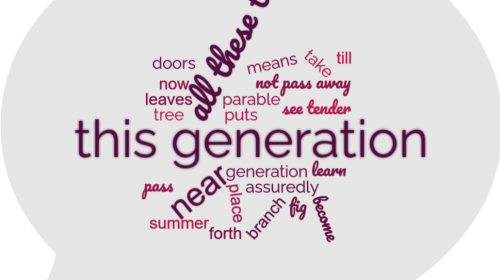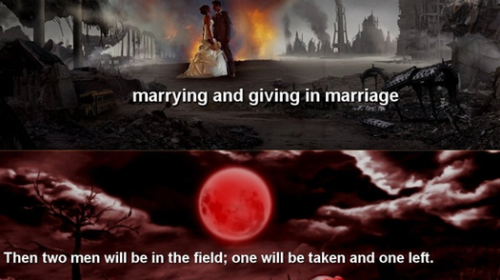
Perpetual Notions

The subject of eternity is fraught with issues when delving into the original languages of the Bible. Without getting into the technical too much, because such blogs and articles are legion, I thought it might be instructive to look at the problem from another angle. The problem is somewhat this: The various words in Hebrew, Aramaic and Greek can mean a really long time, or, sometimes it means “forever,” especially when referring to God.
Therefore, I thought it might be interesting to look at a half dozen of these from more of a logic standpoint. That’s allowed, right? God is logical. We can easily make the case that none is more so than He. What I mean when I say we can look at these verses logically is that we can look at the entire context of the verses, as far as we need to, and see if a case can be made for a literal, perpetual, classic, forever and ever and ever with respect to terra firma.
Long before God set in motion the whole of creation, He purposed in His mind an entire plan of redemption. Ephesians 1 tells us that God even chose us before the foundation of the world. And can we suppose that our all-powerful, all-knowing and wise God can be caught by surprise by the best laid plans of man that God must scrap His own plans, wad it all up and toss it into the trash heap of eternity and begin another attempt? Of course not.
All that as a preamble to note that God executes His plans to perfection and realizes every nuance regardless whatever attempt and mastery the devil or man might conceive of to make things go his own way. There is no such thing as upsetting God’s proverbial apple cart. He made a paradise with full knowledge that in granting man a free will, that free will would choose self interest and beget sin. And so it did and we continue to do.
But God…
What comfort may be found in those two words. No man seeks God, the psalmist wrote and Paul quoted in Romans. Yet, again, He chose us before the foundation of the world. That world, once Paradise with a garden, is intricately woven into the fabric of God’s plan of redemption. Paradise we spoiled; but God…
God chose (according to plan) to not destroy His creation and us with it from the Garden of Eden, but instead promised a Savior, mere steps away from a gate guarded by angels with fiery swords. God endured the insults and sin and wickedness of man until time to preserve a remnant of eight during a flood that did not utterly destroy the earth, but purged it anew.
We should all know the stories through history how that God preserved His remnant, established a people through whom the Savior would come and a land where that Savior would one day sit as King of kings and Lord of lords. Paul tells us in Romans how that even the very creation itself groans with anticipation for that day. Or do we suppose that creation itself groans in dread anticipation of death? The context is that of new birth, not destruction. I would like to attempt a case for the earth groaning in anticipation of a refreshing; a renewal. That God’s plan of redemption is about renewal for a chosen people in a creation that reflects His glory… A creation that though in much need of renewal in order to fully glorify God and our Savior Jesus Christ, includes all creation and not just His sheep, and the restoration of that relationship to Himself, and His paradise, forever and ever. Let us dive in and hopefully I can argue for the affirmative in a reasonable way that makes sense. Our first verse could be Genesis 13:15.
“for all the land which you see I give to you and your descendants forever.”
A couple of things of particular note here. The Lord in the Abrahamic Covenant promised, er…The Promised Land to Abraham (in the future-he never yet got it) and his descendants. Right? What I am attempting to do is make a case that we can say that this is a perpetually existing condition without having to play with the word “forever.” That being, logically, because the Lord told Abraham that this land that is forever is not eventually destroyed and re-created. Certainly renovated, renewed, refreshed, but what land is Abraham’s et al? The land “which you see.” Notice it is not like that land or another land. It is the land which Abraham was beholding with his own eyes. How about another. One or two passages we might be reading into it or mistaking the meaning. To reinforce this meaning of the Abrahamic Covenant, let us jump ahead to Genesis 17:7, 8
nn7 And I will establish My covenant between Me and you and your descendants after you in their generations, for an everlasting covenant, to be God to you and your descendants after you. 8 Also I give to you and your descendants after you the land in which you are a stranger, all the land of Canaan, as an everlasting possession; and I will be their God.”
So this is particular land, once again. It is even named according to its name at the time. It is specified and particular land known at the time and not something post millennial destruction and remade.
The Abrahamic Covenant is for not just any old land. It is for borders we know of which were pointed out to Abraham upon a particular topography with borders of rivers and other physical boundaries at his time. Not that all the Jews will be lifted out to be later replanted on a world not yet in existence.
But, we might ask, will God maybe just lift everyone out at the end of the Millennium, after maybe the Great White Throne Judgment where all will then be glorified and immortal? First off, we know God can and will do as He pleases for His glory. However, one thing we know He will not do is contradict His Word, which is why we must be careful with our understanding and examine multiple scriptures. Let’s look to Jeremiah 7:7
then I will cause you to dwell in this place, in the land that I gave to your fathers forever and ever.
Once again, ignoring the duration of forever, note that specific land “this place” in which land? “The land that I gave to your fathers.” It seems beyond logic that a thousand years (this is a Kingdom passage) could be considered “forever and ever” or even just “forever.” Why not just say, as John did concerning the Kingdom era in Revelation 20, “for a thousand years”?
Amos 9:13-15 says,
13 “Behold, the days are coming,” says the Lord, “When the plowman shall overtake the reaper, [establishes era] And the treader of grapes him who sows seed; The mountains shall drip with sweet wine, And all the hills shall flow with it.nn14 I will bring back the captives of My people Israel; They shall build the waste cities and inhabit them; [why?] They shall plant vineyards and drink wine from them; They shall also make gardens and eat fruit from them.nn15 I will plant them in their land, And no longer shall they be pulled up From the land I have given them,” Says the Lord your God.
So we see that at a time when the reaper (death) is overtaken these conditions will exist. We should ask, is death upon the earth gone during the Millennium? Certainly there is no death in New Jerusalem (Revelation 21f) and why would there be as all in New Jerusalem have been glorified and thus immortal. On the earth though are mortals, the children of believers for a thousand years. Some rebel and experience the judgment of God when they refuse to go to Zion to honor Him and die horribly. Some die at a hundred and are considered young.
I suppose we could argue that, yes, there is death, but the reaper is not as prevalent during the Kingdom on earth at that time. Either way, will those saints in Israel be pulled up, a new world created and then they are put back down in this new replacement? I would argue (1) v.15 says they will no longer be pulled up. Also, (2) a brand newly created earth is not “the land that I have given them.”
Okay, we might still argue that over semantics and interpretative issues. We could say this is just hyperbole-exaggeration to make a point. I have heard this a thousand times before (see what I did there?). And I would say that is a valid possibility if we could see hyperbole already in play in the passage. Absolutely! However, go back and read and you will be hard pressed to find it in the passage elsewhere.
Somewhere in the past we have gotten it into our heads that a passage that is loaded with hyperbole is gospel. That being 2 Peter 3. The entire passage is loaded with hyperbole beginning in chapter 2 about the ferocity and certainty of God’s judgment and wrath. Peter goes from God’s judgment of angels, to Sodom and Gomorrah. He is particularly focused on false teachers. In chapter three Peter is talking about “the day of judgment” and the second coming.
The verses in question begin in verse 10 where most Bible versions recognize and often will have a heading similar to “The Day of the Lord” because they recognize that at his 2nd Coming we see the culmination of the wrath of the Lamb, before the Millennium. So 2 Peter 3:10-13 rightly follows an outline of:
v. 10 the Lord comes as a thief (his church is stolen out of the earth)
v. 10 the Day of the Lord begins (Tribulation) which is very destructive and ends after seven years of wrath at his Coming.
v. 11 therefore, our conduct out to reflect this.
v. 12 reiterates culmination of wrath at his Coming as the Day of God
v. 13 However we look forward to new heavens and earth, “new” being ‘kainos‘ which is the same word used of the saints become “new” creatures upon salvation.
Two places that refer to new heavens and new earth are, obviously, Revelation 21 and originally we read of this in Isaiah 65. No such fiery destructiveness, heavens dissolved and element melting are mentioned in the original Isaiah passage Peter references, and John does not use such language either. This indicates Peter’s use of hyperbole to illustrate the destructiveness of the Tribulation Week. Just as Christ in Matthew 24:21, 22 says of that time, “For then there will be great tribulation, such as has not been since the beginning of the world until this time, no, nor ever shall be. And unless those days were shortened, no flesh would be saved; but for the elect’s sake those days will be shortened.” This is pre-millennial and not post, as some interpreters of 2 Peter 3 would have us understand.
In the Isaiah 65 passage, we have New Heaven and New Earth in v. 17, followed by Kingdom language describing that New Heaven and New Earth and Jerusalem’s restoration thereafter. Not before. And no fiery fervent melting and heat mentioned. Okay, that was somewhat an aside, but bears upon the matter. Why? Well, will the earth be utterly destroyed and re-created from whole cloth or not? Let’s look to our next passage, Isaiah 55:12, 13.
12 “For you shall go out with joy, And be led out with peace; The mountains and the hills Shall break forth into singing before you, And all the trees of the field shall clap their hands.nn13 Instead of the thorn shall come up the cypress tree, And instead of the brier shall come up the myrtle tree; And it shall be to the Lord for a name, For an everlasting sign that shall not be cut off.”
Or another; Joel 3:16-20.
16 The Lord also shall roar out of Zion, and utter his voice from Jerusalem; and the heavens and the earth shall shake: but the Lord will be the hope of his people, and the strength of the children of Israel.
18 And it shall come to pass in that day, that the mountains shall drop down new wine, and the hills shall flow with milk, and all the rivers of Judah shall flow with waters, and a fountain shall come forth out of the house of the Lord, and shall water the valley of Shittim.
20 But Judah shall dwell for ever, and Jerusalem from generation to generation.
This is clearly a Kingdom passage that shall run from generation to generation and “forever.” These would appear to indicate specific, current locations during the Millennium that will nevertheless continue afterward. Yet, possible that God will simply remake and name these new places the same names? Here is one more passage to consider.
Ezekiel 37:25
And they shall dwell in the land that I have given unto Jacob [Israel] my servant, wherein your fathers have dwelt; and they shall dwell therein, even they, and their children, and their children’s children for ever: and my servant David shall be their prince for ever.
So if this is millennial, and people will live extended lives once again, how can children’s children dwell forever in a place where their fathers dwelt if even most of these are still alive during a great destructive remaking of the heavens and earth?
Just to reiterate the permanence of it all, read the following verses.
26 Moreover I will make a covenant of peace with them, and it shall be an everlasting covenant with them; I will establish them and multiply them, and I will set My sanctuary in their midst forevermore. 27 My tabernacle also shall be with them; indeed I will be their God, and they shall be My people. 28 The nations also will know that I, the Lord, sanctify Israel, when My sanctuary is in their midst [during the Kingdom] forevermore.” ’ ”
We know from the final chapter of this book that the Messiah Jesus (Branch) will build that sanctuary, a new Temple, himself. Ezekiel 42:6 says of this Millennial Temple,
6 Then I heard Him speaking to me from the temple, while a man stood beside me. 7 And He said to me, “Son of man, this is the place of My throne and the place of the soles of My feet, where I will dwell in the midst of the children of Israel forever.
Therefore, being a rather strict literalist, I lean toward understanding that the Lord, his tabernacle and temple where he will dwell with his people during the Millennium is established as eternal, which means that whatever eternity future looks like after the Kingdom era, it will include this eternal tabernacle in a renewed and rebuilt Jerusalem, on a renewed and refreshed earth within the renewed heavens.









